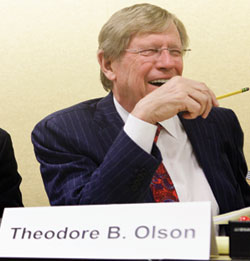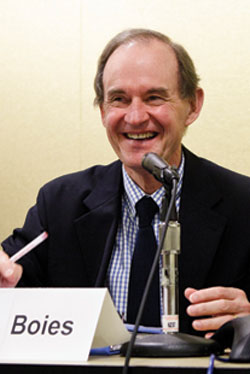Witnesses Describe State and Local Courts Reeling from Budget Cutbacks

Photo of Theodore Olson by Marc Mauldin
State judges go without health insurance, courts beg for freebies, clerks refuse filings, civil trials are suspended. Tales recounted by a parade of witnesses on the opening day of the 2011 ABA Midyear Meeting in Atlanta painted a disturbing picture of how courts around the U.S. are being affected by budget cutbacks as state governments continue to reel from economic woes.
In the first public hearing of the Task Force on Preservation of the Justice System, appointed by ABA President Stephen N. Zack in August, Georgia Supreme Court Chief Justice Carol W. Hunstein described how the court has taken to soliciting vendors for free pens and pencils.
Former New Hampshire Chief Justice John T. Broderick Jr. told about his decision to suspend civil jury trials in 2009 to save money. And witnesses testified that in Michigan many state court judges are going without health insurance because the state only pays their salaries and many counties simply don’t have the money to cover insurance costs.
“We are on a slippery slope that tends toward justice for some rather than justice for all,” warned Kim M. Keenan, general counsel for the National Association for the Advancement of Colored People in Baltimore.
And the plight of the courts and the parties who rely on them is likely to get worse before it gets better, the panel was told. Manuel Medrano, a lawyer and television legal analyst in Los Angeles, testified that because of stricter enforcement of fines by cash-hungry courts, poor people are more frequently going to jail. Even witnesses representing the business community said their disputes are going unresolved.
“The enforcement of economic and property rights is the cornerstone of any free-market economy,” said Oregon Supreme Court Chief Justice Paul De Muniz.

Photo of David Boies by Marc Mauldin
TROUBLE IN 29 STATES
The National Center for State Courts found that judicial systems in 29 states face budget cutbacks imposed by legislatures in the near future. The State Bar of Georgia estimates that recent cutbacks for the state courts have resulted in the loss of 3,500 to 7,100 jobs, and that the adverse effect on the state’s total economic output could be as high as $800 million a year.
The task force is co-chaired by David Boies, Armonk, N.Y.-based chairman of Boies, Schiller & Flexner, and Theodore B. Olson, a partner at Gibson, Dunn & Crutcher in Washington, D.C, and a former U.S. solicitor general.
Boies said that going into the hearing, task force members had a good idea of the general themes they would hear. But it wasn’t until the hearing that members were aware of all the “detail, statistics, personal stories and the passion,” he said. “It brings home with power the themes we’ve been talking about.”
Midway through the hearing, Zack told the audience that Rep. Hal Rogers, a Kentucky Republican who chairs the House Appropriations Committee, will propose a resolution seeking to reduce funding for the Legal Services Corp. for the remainder of fiscal 2011 from $420 million to $350 million. Over a year, that would translate into a 28 percent cut.
Commenting on the testimony at the hearing, Zack, a partner at Boies, Schiller & Flexner in Miami, said, “Anybody who listens to this has got to be moved by the seriousness of this problem.”
Write a letter to the editor, share a story tip or update, or report an error.


